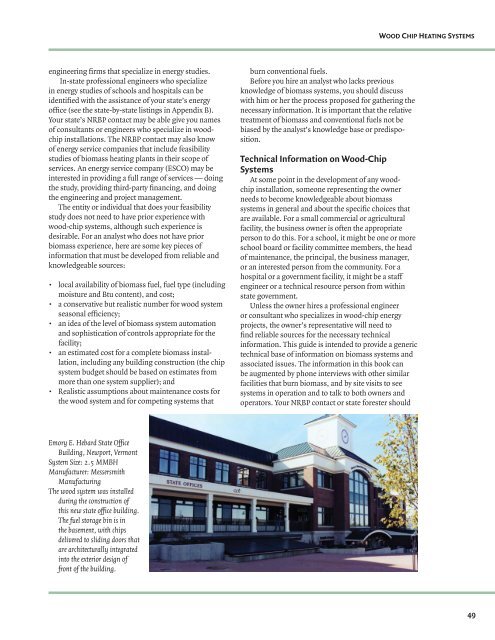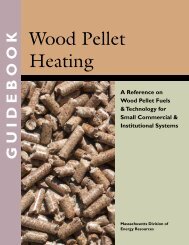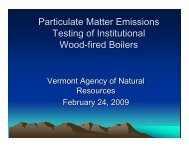Wood-Chip Heating Systems - Biomass Energy Resource Center
Wood-Chip Heating Systems - Biomass Energy Resource Center
Wood-Chip Heating Systems - Biomass Energy Resource Center
You also want an ePaper? Increase the reach of your titles
YUMPU automatically turns print PDFs into web optimized ePapers that Google loves.
engineering fi rms that specialize in energy studies.<br />
In-state professional engineers who specialize<br />
in energy studies of schools and hospitals can be<br />
identifi ed with the assistance of your state’s energy<br />
offi ce (see the state-by-state listings in Appendix B).<br />
Your state’s NRBP contact may be able give you names<br />
of consultants or engineers who specialize in woodchip<br />
installations. The NRBP contact may also know<br />
of energy service companies that include feasibility<br />
studies of biomass heating plants in their scope of<br />
services. An energy service company (ESCO) may be<br />
interested in providing a full range of services — doing<br />
the study, providing third-party fi nancing, and doing<br />
the engineering and project management.<br />
The entity or individual that does your feasibility<br />
study does not need to have prior experience with<br />
wood-chip systems, although such experience is<br />
desirable. For an analyst who does not have prior<br />
biomass experience, here are some key pieces of<br />
information that must be developed from reliable and<br />
knowledgeable sources:<br />
• local availability of biomass fuel, fuel type (including<br />
moisture and Btu content), and cost;<br />
• a conservative but realistic number for wood system<br />
seasonal effi ciency;<br />
• an idea of the level of biomass system automation<br />
and sophistication of controls appropriate for the<br />
facility;<br />
• an estimated cost for a complete biomass installation,<br />
including any building construction (the chip<br />
system budget should be based on estimates from<br />
more than one system supplier); and<br />
• Realistic assumptions about maintenance costs for<br />
the wood system and for competing systems that<br />
Emory E. Hebard State Offi ce<br />
Building, Newport, Vermont<br />
System Size: 2.5 MMBH<br />
Manufacturer: Messersmith<br />
Manufacturing<br />
The wood system was installed<br />
during the construction of<br />
this new state offi ce building.<br />
The fuel storage bin is in<br />
the basement, with chips<br />
delivered to sliding doors that<br />
are architecturally integrated<br />
into the exterior design of<br />
front of the building.<br />
burn conventional fuels.<br />
Before you hire an analyst who lacks previous<br />
knowledge of biomass systems, you should discuss<br />
with him or her the process proposed for gathering the<br />
necessary information. It is important that the relative<br />
treatment of biomass and conventional fuels not be<br />
biased by the analyst’s knowledge base or predisposition.<br />
Technical Information on <strong>Wood</strong>-<strong>Chip</strong><br />
<strong>Systems</strong><br />
At some point in the development of any woodchip<br />
installation, someone representing the owner<br />
needs to become knowledgeable about biomass<br />
systems in general and about the specifi c choices that<br />
are available. For a small commercial or agricultural<br />
facility, the business owner is often the appropriate<br />
person to do this. For a school, it might be one or more<br />
school board or facility committee members, the head<br />
of maintenance, the principal, the business manager,<br />
or an interested person from the community. For a<br />
hospital or a government facility, it might be a staff<br />
engineer or a technical resource person from within<br />
state government.<br />
Unless the owner hires a professional engineer<br />
or consultant who specializes in wood-chip energy<br />
projects, the owner’s representative will need to<br />
fi nd reliable sources for the necessary technical<br />
information. This guide is intended to provide a generic<br />
technical base of information on biomass systems and<br />
associated issues. The information in this book can<br />
be augmented by phone interviews with other similar<br />
facilities that burn biomass, and by site visits to see<br />
systems in operation and to talk to both owners and<br />
operators. Your NRBP contact or state forester should<br />
WOOD CHIP HEATING SYSTEMS<br />
49





